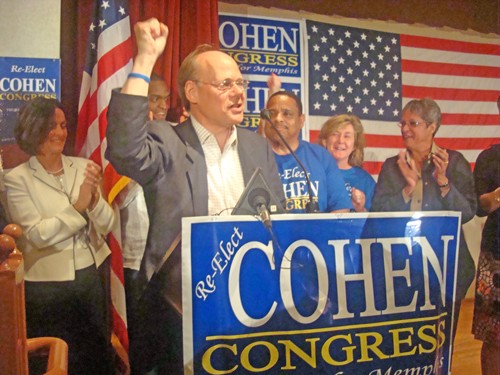This is what Steve Cohen wanted to happen the first time he
ran for Congress in the 9th District, in 1996 – a 4-1 victory over
his nearest opponent, a win so overwhelming and so uniform in his favor
throughout the demographic corners of his district that he could truthfully
claim to represent the entirety of his people.
It was, as he said amid the delirium of his victory celebration in the ballroom
of the Holiday Inn on Central Avenue, a triumph for the idea that “we can all
work together” and a refutation of the “negative politics” that a desperate
challenger had attempted in the last few days to save herself from the palpable
yearning for unity that had reached high tide among the communities of the 9th.
The 79 percent -to-19 percent spread between himself and Nikki Tinker was higher
than even the most optimistic pre-election forecasts of Cohen supporters. Unofficial totals from all 208 precincts were: Cohen, 50,284; Tinker, 11,814; State Rep. Joe Towns, Jr., 914; James C. Gregory, 180; and Isaac Richmond, 172. The incumbent appeared to have a comfortable margin across all demographic and geographic lines.
It was a personal triumph for Cohen, who can take the overwhelming approval of
his constituents into what is likely to be pro forma general election contest
with independent Jake Ford. When he first ran for Congress 12 years ago, Cohen
had been defeated in the Democratic primary by Harold Ford Jr., and was openly
disappointed that his long and commendable record in the state Senate had not, as he saw it,
been properly appraised.
Even his victory by a 31 percent plurality in a crowded primary field two years
ago was regarded by some as a fluke of mathematics – certainly by Tinker, a
corporate attorney and Alabama transplant who thought her 26 percent showing
back then could be improved upon the second time around. Tinker never quite
bothered to put a platform before the voters, and, on the evidence of two late
ads, seemed to believe that victory would be hers if, in the most stark and
divisive way, she could remind the voters of a 60-percent majority-black
district that she was an African American and a Christian, while Cohen was white
and Jewish.
The incumbent congressman himself ran on the record of his
first two years in office, during which he had both become a national figure and
paid serious attention to the special needs and aspirations of his
African-American constituents. A late accomplishment, the passage by acclamation
in the House of Representatives of his resolution apologizing for slavery, had
encompassed both aspects of his tenure so far.
The result was that, as Cohen noted after his victory
speech, he had come out ahead “with man and woman, with
black and white, with Christian and Jew, with young and old, with the follically
challenged …” (here he all but tapped his own balding pate) “..and with the
hirsute.”
It seemed clear that the final margin was as large as it
was both because Cohen and what he represented won convincingly and because
Tinker and the divisiveness she was seen to symbolize just as clearly lost.
 Chris Davis
Chris Davis
Candidate Tinker being consoled by employer and chief backer Phil Trenary, Pinnacle Airlines CEO
On the last two days of his campaign, she had seen herself
repudiated by the Emily’s List PAC which had earlier endorsed her; by former
congressman Harold Ford Jr., whom she had once worked for and whose aura she
consistently attempted to invoke; and, most crucially, by Barack Obama himself,
the current lion of Democratic hopes who will become the party’s presidential
nominee at a national convention later this month.
As for Cohen, his triumph turned out to be a victory also
for the dream of racial equality and political harmony, or so at least was the
belief proclaimed Thursday night, spontaneously and separately, by such icons of
Memphis civil rights history as Maxine Smith and Russell Sugarmon and Minerva
Johnican. Cohen’s win was, they all agreed, the culmination of the racial unity
and colorblind vision they had all set out to achieve.
There was yet another major development on display in
Thursday night’s election results, and Cohen noted it, too, in his remarks – the
final establishment of a long-building demographics in favor of Democratic
candidates countywide.
In every Shelby County election since partisan elections
were first established in 1992, Republicans had dominated. This time around was
different.
 jb
jb
Democratic incumbent Paul Mattila defeated Republican Ray
Butler and independent M. LaTroy Williams for trustee. Unofficial totals were: Mattila,54,734; Butler, 29,977; Williams, 8, 66. Two other candidates, independents like Williams (who styled himself “the real Democrat”) got votes as well: Tammy Warren, 2,102; and David Vinciarelli, 1,525.
Democrat Cheyenne Johnson beat Republican Bill Giannini
convincingly in the assessor’s race. Unofficial totals were: Johnson, 59,637; Giannini, 39,057.
Democrat Otis Jackson won out over Republican incumbent
Chris Turner for General Sessions clerk. The incumbent, who eked out a narrow win four years ago with help from a third candidate, black independent Robert Mathews Jr, was too far behind this time, to get the benefit of vote split, though Mathews ran again. Unofficial totals were: Jackson, 51,438; Turner, 43,971; and Mathews 3,313.
In a closely watched non-partisan race, Criminal Court
Judge John Fowlkes, appointed to fill a vacancy during the last year, won
election in his own right over three opponents. Unofficial totals were Fowlkes, 44,581; Latonya Sue Burrow, 21,874; Michael G. Floyd, 12,071; and Claiborne H. Ferguson, 6,240.
In another contested congressional race, this one involving
Republicans, incumbent 7th District representative Marsha Blackburn
had a two-to-one margin over challenger Tom Leatherwood, the Shelby County register. With 248 of 265 precincts reporting, Blackburn had 29,158 votes to Leatherwood’s 15,636.
And Nashville lawyer Bob Tuke, as expected, won the
Democratic Party primary for U.S. Senate over opponents Mike Padgett and Kenneth
Eaton. The major surprise here was a strong showing from previously unheralded and unknown Gary Davis, who ended up in second place, prompting some observers to conclude that Middle Tennessee voters had confused him with 4th District congressman Lincoln Davis.
With 2,192 of 2,290 precincts reporting, the unofficial totals: were Tuke 54,613; Davis 37,193; Padgett, 32,190; Mark Clayton, 30,359; Eaton,13,718; and Leonard Ladner 4,431.
Tuke, who, along with Republican incumbent Lamar Alexander, was in Memphis on Friday morning, will face Alexander in November.
More details and further analysis of these and
other races to follow.